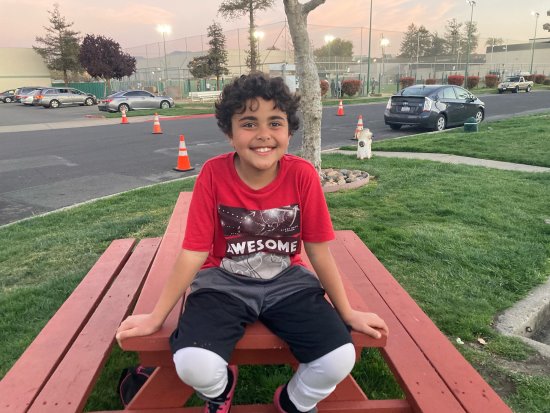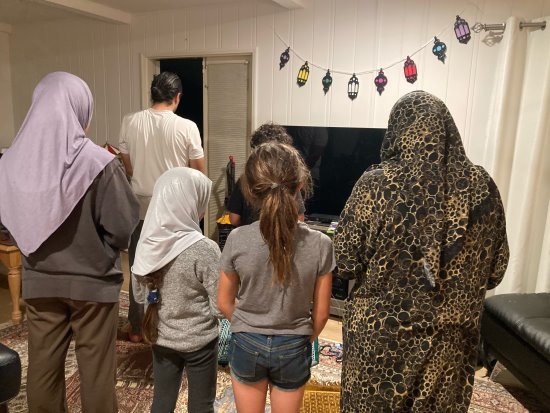
| ||||||
Even if the idea of taking another reading and writing class in a whole different language seems like a lot of work to Omar, he understands why he's doing it.
"I love my life here, but maybe I'll go back and visit my family in Egypt one day, inshallah (God Willing)," Omar says. "Since I've lived in America for so long, I don't want to be like, `Hi, I have nothing to say because I forgot my home language.'"
Omar, his 8-year-old sister Farida and his 15-year-old sister Fayrouz and their parents Faten and Farouk Mishak moved to Lafayette from Cairo, Egypt some five years ago. They are among the 1.8 billion Muslims around the world observing the holy month of Ramadan, which began on the first weekend in April and ends in early May. Muslims who observe Ramadan fast from food and water from sunup to sun down at which time they have Iftar, the special meal for breaking fast, which proceeds prayer. While five daily prayers are a core part of the Muslim faith, families like the Mishaks say Ramadan helps them be extra intentional about the practice of prayer and breaking bread in community. How does Omar's life as an LES student change during Ramadan? "It's normal. I just don't bring a water bottle and I don't bring lunch during that time," Omar says. But his hunger and thirst is for a greater cause. It's all about empathy building. "God wants you to know what homeless or hungry people feel like. Sometimes (unhoused or food insecure) people don't get to break their fast at sun down. They just don't eat at all," Omar says. "This all helps teach you how to be humble."
There are challenging moments - times in which resolve and will power is tested - and joyous celebratory moments almost each and everyday. "Sometimes I might go for a walk to pass the time when it's getting closer to breaking fast and I might walk past the yogurt shack or something that looks extra delicious and I can't have it," Omar says with a smile. "Spending time with family and eating (breaking fast) together is my favorite part."
While Islam doesn't require children to fast prior to puberty, Omar began fasting when he was in third grade. "I once had a teacher who tried to force me to break my fast by drinking water because she didn't understand," Omar recalls.
To help his peers and instructors better understand Ramadan, this year Omar, with the help of his mother, prepared Ramadan care packages including dried fruit, nuts and information about the tradition. He also read a book that he wrote about Ramandan. "I was happy to share," Omar says. "I ran out of goodie bags because a lot of kids wanted to bring them home to share with siblings."
Omar's mother, Faten, says that's a great problem to have. To remedy it, she plans to prepare more Ramadan gifts to share after spring break. Even if it's a lot of work for Faten who works full time for Levis, she says it's well worth it both for the charity aspect and for helping her kids know that they do, in fact, belong in the community.
"The school is a big family for my kids so I'd like my kids to share the love and distribute some of our cultural practices from Ramadan. The kids loved the dried fruits and nuts, things we use to break our fast. We gave out 150 packs and we'll need more after spring break," Faten says with an ear-to-ear smile. "Ramadan is not only for Muslims and it's not just about fasting about food. It's for human beings and it gives us an opportunity to fast from bad habits or behaviors we want to change." While one of the tenants of Ramadan is in providing charity to those in need, Faten says there are many forms of charity. "Even if you see someone and can offer a smile you can make his or her day. It's about you doing your part to make the world a little better."
Omar's teacher, Dr. Dana Fry, says there's always an educational payoff when making time in the classroom to talk about culture and space to celebrate differences. "When we realize we have a lot in common with others, it's easier to have empathy and to see ourselves in their shoes. By having children bring their beliefs and customs to the classroom to share, children can learn from their friends that we are very much the same," Fry says. "Children can learn an appreciation for customs and religions (other than their own) and perhaps (we can) stop the cycle of ignorance and fear that develop when we don't open our minds and our hearts."
Omar's sister Fayrouz is a sophomore at Campolindo High School, where she studies German, plays softball and is involved with leadership and diversity activities. The last thing Fayrouz did before going on spring break was collaborate with Campolindo's librarian to highlight books by and about Muslims. "It's important to have Muslims reflected in literature. That way people can get beyond stereotypes and know us as people," Fayrouz says. When, during an Iftar, a fast breaking meal with her family, Fayrouz was asked why that was important to her, she lit up as she explained it comes down to just one thing: "Representation."

Reach the reporter at:
